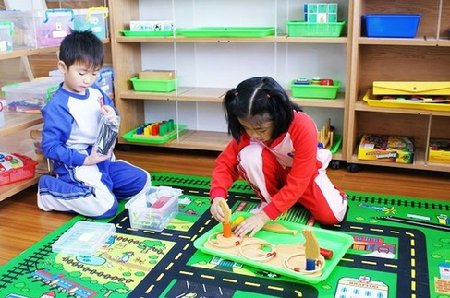But there are also problems with this situation. “Grandparents often spoil their kids; they are willing to buy them everything,” Lü says. She recalls her parents taking care of her daughter and buying her fried chicken and chips at KFC everyday on their way home from school.
Lü read up on child development in a number of books, but when she explained the theories to her parents, she was greeted with blank stares. In the end, she decided to raise her daughter by herself. Sending her daughter to early childhood education was also her decision; she recognizes it as helpful for both socializing children and making sure they pick up good habits early.

A survey on parenting conducted by the Women’s Federation of Jiaxing City of Zhejiang Province shows that market demand for early childhood education is huge. About 53.3 percent of parents in Jia-xing believe it important, and 39.3 percent believe it relatively important, for children aged zero to three years old.
As for staff and teachers at kindergartens and other early childhood education institutes in the city, admittedly a biased group, the number of supporters of early education is much higher: 75.2 percent believe it essential for toddlers to get an early education, and 94.4 percent said kids who receive early childhood education would perform better once they enter the compulsory school system.
Other surveys from around the country show similar results. Market demand for early children education is strong wherever one looks in China. In Jia-xing, for instance, over 80 percent of zero-to-three-year-old children stay at home under the care and education of their grandparents; less than 20 percent attend early education classes. There are simply not enough places in the classes, and demand is much stronger than supply.
The Beijing Development Report on the Rule of Law (2011) shows that at the end of 2011 there were 1,305 kindergartens in Beijing, with another 302 branch kindergartens. Among them were 1,010 public kindergartens enrolling 311,000 children. But there were at least 60,000 children unable to get places in preschool education programs, which means Beijing currently lacks at least 300 kindergartens.
From Luxury to Necessity
Wang Jianli, vice president of the RYB Education Institute, recently went to the U.S. with staff from the National Health and Family Planning Commission to learn about the country’s infant early stage development practices. During the 21-day trip, her delegation visited the World Bank and the United Nations International Children’s Emergency Fund (UNICEF), and went to top-flight universities such as Harvard and Columbia to speak to researchers. They also conducted their own investigations at childcare administrations in California and New York City, and at the Early Childhood Association and the Children’s Aid Association.
American institutions’ emphasis on a well-rounded education impressed Wang greatly right from the start. On coming back to China, she wrote about her observations in a lengthy piece for RYB’s newsletter.
Wang says RYB’s focus was on school-age children when the institute was founded in 1998. But over time, she says her colleagues realized the huge demand – and need – for promoting children’s early development. “There are 16 million newborns annually in China. Parents are more and more aware of the importance of early education,” she says.
